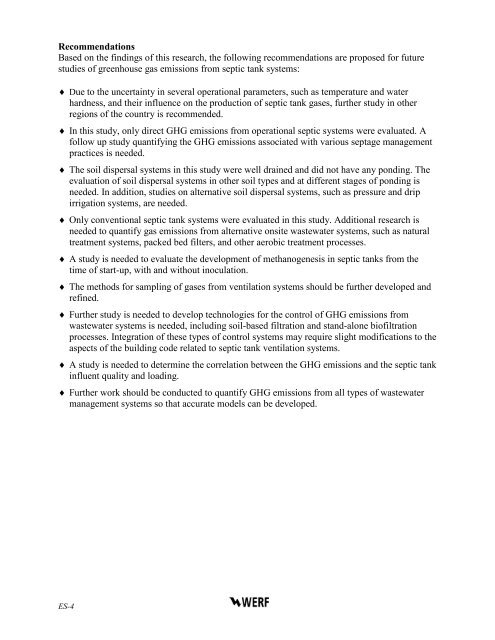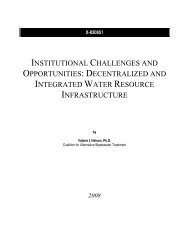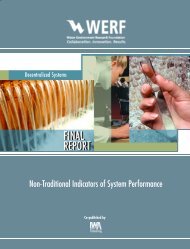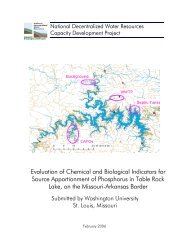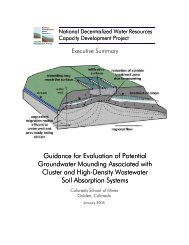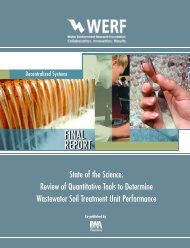Evaluation of Greenhouse Gas Emissions from Septic ... - Geoflow
Evaluation of Greenhouse Gas Emissions from Septic ... - Geoflow
Evaluation of Greenhouse Gas Emissions from Septic ... - Geoflow
Create successful ePaper yourself
Turn your PDF publications into a flip-book with our unique Google optimized e-Paper software.
RecommendationsBased on the findings <strong>of</strong> this research, the following recommendations are proposed for futurestudies <strong>of</strong> greenhouse gas emissions <strong>from</strong> septic tank systems:♦ Due to the uncertainty in several operational parameters, such as temperature and waterhardness, and their influence on the production <strong>of</strong> septic tank gases, further study in otherregions <strong>of</strong> the country is recommended.♦ In this study, only direct GHG emissions <strong>from</strong> operational septic systems were evaluated. Afollow up study quantifying the GHG emissions associated with various septage managementpractices is needed.♦ The soil dispersal systems in this study were well drained and did not have any ponding. Theevaluation <strong>of</strong> soil dispersal systems in other soil types and at different stages <strong>of</strong> ponding isneeded. In addition, studies on alternative soil dispersal systems, such as pressure and dripirrigation systems, are needed.♦ Only conventional septic tank systems were evaluated in this study. Additional research isneeded to quantify gas emissions <strong>from</strong> alternative onsite wastewater systems, such as naturaltreatment systems, packed bed filters, and other aerobic treatment processes.♦ A study is needed to evaluate the development <strong>of</strong> methanogenesis in septic tanks <strong>from</strong> thetime <strong>of</strong> start-up, with and without inoculation.♦ The methods for sampling <strong>of</strong> gases <strong>from</strong> ventilation systems should be further developed andrefined.♦ Further study is needed to develop technologies for the control <strong>of</strong> GHG emissions <strong>from</strong>wastewater systems is needed, including soil-based filtration and stand-alone bi<strong>of</strong>iltrationprocesses. Integration <strong>of</strong> these types <strong>of</strong> control systems may require slight modifications to theaspects <strong>of</strong> the building code related to septic tank ventilation systems.♦ A study is needed to determine the correlation between the GHG emissions and the septic tankinfluent quality and loading.♦ Further work should be conducted to quantify GHG emissions <strong>from</strong> all types <strong>of</strong> wastewatermanagement systems so that accurate models can be developed.ES-4


